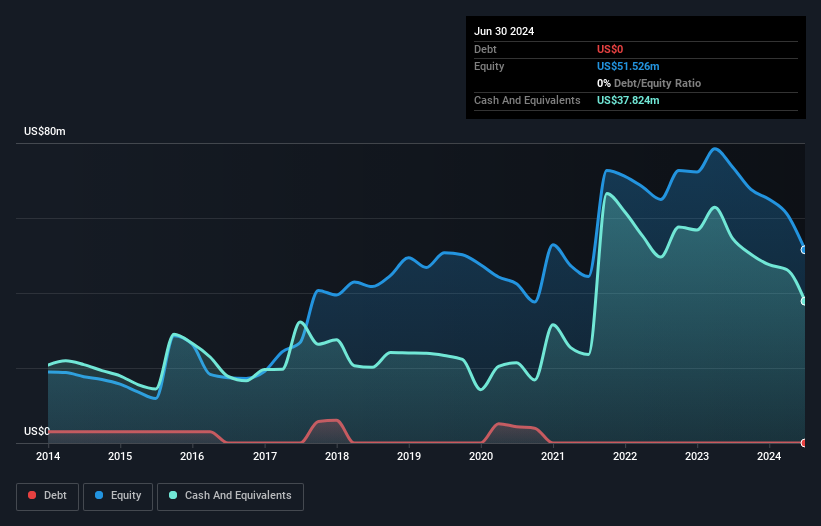- United States
- /
- Semiconductors
- /
- NasdaqCM:PXLW
Is Pixelworks (NASDAQ:PXLW) In A Good Position To Invest In Growth?
There's no doubt that money can be made by owning shares of unprofitable businesses. For example, although software-as-a-service business Salesforce.com lost money for years while it grew recurring revenue, if you held shares since 2005, you'd have done very well indeed. Nonetheless, only a fool would ignore the risk that a loss making company burns through its cash too quickly.
So, the natural question for Pixelworks (NASDAQ:PXLW) shareholders is whether they should be concerned by its rate of cash burn. For the purpose of this article, we'll define cash burn as the amount of cash the company is spending each year to fund its growth (also called its negative free cash flow). We'll start by comparing its cash burn with its cash reserves in order to calculate its cash runway.
Check out our latest analysis for Pixelworks
Does Pixelworks Have A Long Cash Runway?
A cash runway is defined as the length of time it would take a company to run out of money if it kept spending at its current rate of cash burn. When Pixelworks last reported its June 2024 balance sheet in August 2024, it had zero debt and cash worth US$38m. Importantly, its cash burn was US$16m over the trailing twelve months. Therefore, from June 2024 it had 2.4 years of cash runway. That's decent, giving the company a couple years to develop its business. The image below shows how its cash balance has been changing over the last few years.

How Well Is Pixelworks Growing?
It was fairly positive to see that Pixelworks reduced its cash burn by 25% during the last year. And operating revenue was up by 4.6% too. On balance, we'd say the company is improving over time. Clearly, however, the crucial factor is whether the company will grow its business going forward. So you might want to take a peek at how much the company is expected to grow in the next few years.
How Easily Can Pixelworks Raise Cash?
While Pixelworks seems to be in a fairly good position, it's still worth considering how easily it could raise more cash, even just to fuel faster growth. Issuing new shares, or taking on debt, are the most common ways for a listed company to raise more money for its business. Commonly, a business will sell new shares in itself to raise cash and drive growth. We can compare a company's cash burn to its market capitalisation to get a sense for how many new shares a company would have to issue to fund one year's operations.
Pixelworks' cash burn of US$16m is about 38% of its US$41m market capitalisation. That's fairly notable cash burn, so if the company had to sell shares to cover the cost of another year's operations, shareholders would suffer some costly dilution.
Is Pixelworks' Cash Burn A Worry?
Even though its cash burn relative to its market cap makes us a little nervous, we are compelled to mention that we thought Pixelworks' cash runway was relatively promising. While we're the kind of investors who are always a bit concerned about the risks involved with cash burning companies, the metrics we have discussed in this article leave us relatively comfortable about Pixelworks' situation. An in-depth examination of risks revealed 3 warning signs for Pixelworks that readers should think about before committing capital to this stock.
Of course Pixelworks may not be the best stock to buy. So you may wish to see this free collection of companies boasting high return on equity, or this list of stocks with high insider ownership.
New: Manage All Your Stock Portfolios in One Place
We've created the ultimate portfolio companion for stock investors, and it's free.
• Connect an unlimited number of Portfolios and see your total in one currency
• Be alerted to new Warning Signs or Risks via email or mobile
• Track the Fair Value of your stocks
Have feedback on this article? Concerned about the content? Get in touch with us directly. Alternatively, email editorial-team (at) simplywallst.com.
This article by Simply Wall St is general in nature. We provide commentary based on historical data and analyst forecasts only using an unbiased methodology and our articles are not intended to be financial advice. It does not constitute a recommendation to buy or sell any stock, and does not take account of your objectives, or your financial situation. We aim to bring you long-term focused analysis driven by fundamental data. Note that our analysis may not factor in the latest price-sensitive company announcements or qualitative material. Simply Wall St has no position in any stocks mentioned.
About NasdaqCM:PXLW
Pixelworks
Develops and markets semiconductor and software solutions for mobile, home and enterprise, over-the-air, and cinema markets in the United States, Japan, China, and Taiwan.
Flawless balance sheet with slight risk.
Similar Companies
Market Insights
Community Narratives



